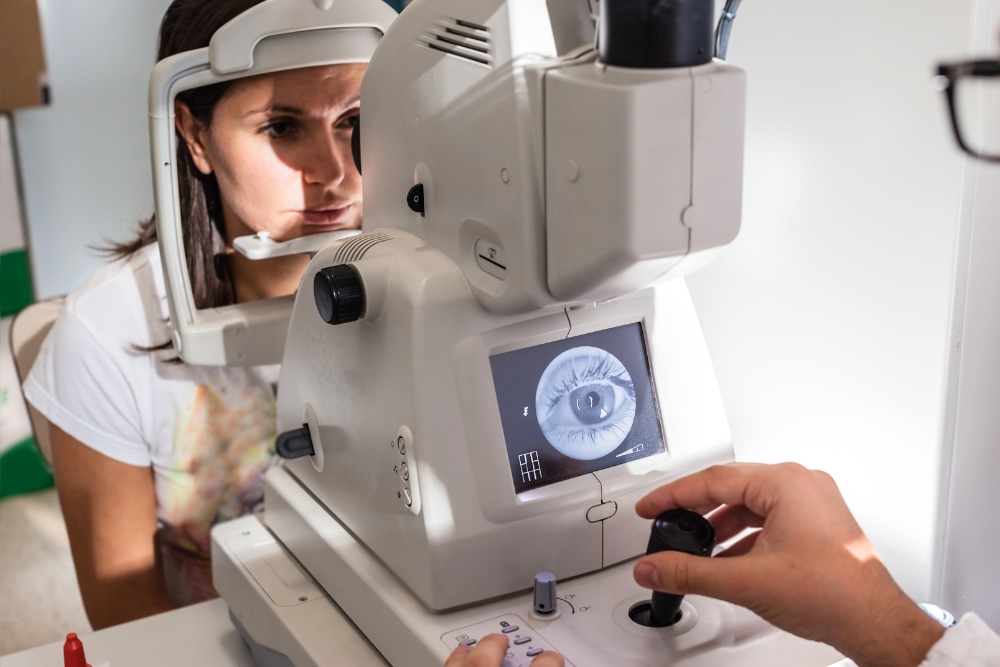-
Retinal Detachment Symptoms and Treatment in 2025
-


Are you suddenly seeing flashes of light, new floaters, or a shadow over your vision? These aren’t just minor changes – they could be early symptoms of retinal detachment, a serious eye condition that can lead to permanent vision loss if left untreated.
Hi, I’m Dr. [Name], Consultant Ophthalmologist at RAK Hospital in Ras Al Khaimah. I’ve treated hundreds of patients with retinal tears, detached retina, and other sight-threatening conditions – many of whom waited too long, thinking it was just fatigue or aging.
The most common question I get is:
“Doctor, how can a small tear in the eye lead to blindness?”
Here’s what many people don’t realize: The retina is a thin, light-sensitive layer of tissue at the back of your eye. It’s responsible for capturing visual information and sending it to your brain. When this delicate tissue pulls away from the retina’s blood vessels, it can no longer function -this is what we call a detached retina.
At RAK Hospital, we specialize in early diagnosis and advanced surgical repair of all types of retinal detachment, including rhegmatogenous retinal detachment – the most common type. With modern tools like vitrectomy, pneumatic retinopexy, scleral buckling, and laser surgery, our team offers world-class care right here in the UAE.
Your retina is a thin, delicate layer of tissue at the back of the eye – it works like the film in a camera, capturing light and sending signals to the brain so you can see clearly.
Retinal detachment happens when this layer of tissue pulls away from the underlying tissue that surrounds it and the retina’s blood vessels, which supply it with oxygen and nutrients. Without prompt treatment, this separation can lead to permanent vision loss.
In most cases, retinal detachment begins with a retinal tear, where a small break forms in the tissue. This allows fluid to pass through and lift the retina off the back of the eye – leading to a detached retina.
If you’re seeing sudden floaters, flashes of light, or a shadow creeping into your vision, don’t wait. These are classic symptoms of retinal detachment, and it’s considered a medical emergency.
There are three main types of retinal detachment, each with different causes and treatments:
This is the most common type, caused by a retinal tear. Fluid passes through the tear and separates the retina from the tissue beneath.
Usually age-related or linked to lattice degeneration.
This occurs when scar tissue forms on the retina’s surface and pulls the retina away from its normal position.
Common in patients with diabetic retinopathy or other vascular eye conditions.
In this type, there’s no retinal tear. Instead, fluid collects beneath the retina due to inflammation, blood vessel leakage, or tumors.
Often linked to a cancer behind the retina (choroidal melanoma) injury, infection, or inflammatory disorders.
Retinal detachment often starts with subtle changes – but ignoring them can cost you your vision.
Here are the most common symptoms of retinal detachment to watch for:
These are early warning signs that your retina may be tearing or pulling away from the back of the eye. In some cases, patients also report seeing blood in the eye or a sudden drop in visual clarity.
A dilated eye exam is essential to diagnose the condition early and prevent permanent vision loss.
Don’t wait. If you experience these symptoms, visit an eye specialist or retina surgeon immediately.
While retinal detachment can happen suddenly, there are underlying risk factors that increase your chances:
Other causes include inflammatory eye conditions, high myopia (severe nearsightedness), and tumors affecting the eye.
At RAK Hospital, we take a detailed history and conduct advanced retinal scans to evaluate your individual risk factors for retinal detachment – so we can act before vision is compromised.
At RAK Hospital, we believe early diagnosis is the key to saving vision.
When a patient reports flashes of light, sudden floaters, or partial vision loss, we immediately perform a comprehensive eye exam.
This includes:
Why it matters:
A retinal detachment can lead to central vision loss if not caught in time. The retina doesn’t heal on its own – it must be reattached through surgery.
That’s why our eye specialists recommend regular checkups for anyone with high myopia, a history of eye surgery, or other eye conditions.
At RAK Hospital, our retina surgeons are equipped with the most advanced techniques to treat all types of retinal detachment – from early-stage tears to complex, full detachment cases.
Here are the treatment options we offer:
A minimally invasive procedure where a small air bubble is injected into the eye to push the retina back into place. This is usually done for simpler cases of retinal tear or small detachment.
A flexible silicone band is placed around the eye to relieve tension and allow the retina to reattach. This is ideal when the detachment is caused by a retinal tear on the outer edges.
In this advanced surgery, we remove the vitreous gel from the eye to gain access to the retina. The retina is then repositioned and supported using a gas bubble or silicone oil. This is recommended in cases of severe detachment or when other methods are not suitable.
Our retina experts evaluate each case carefully to choose the most effective treatment, balancing safety, precision, and recovery time.
When it comes to retinal detachment treatment in the UAE, experience, technology, and trust matter most – and RAK Hospital delivers on all fronts.
Here’s why thousands trust us with their eye health:
Whether you’re experiencing early warning signs or need urgent retina surgery, we ensure you get the best retinal detachment treatment in Ras Al Khaimah with compassion and precision.
A detached retina won’t heal on its own – and waiting can lead to permanent blindness.
At RAK Hospital, we combine world-class expertise, compassionate care, and cutting-edge technology to provide the advanced retinal detachment treatment in the UAE.
Don’t ignore the signs. Book your comprehensive dilated eye exam today with our retina specialists.
Let’s answer some of the most common concerns we hear from our patients:
Q: Is retinal detachment painful?
A: Not always – but symptoms like flashes of light, floaters, or sudden vision loss may indicate something serious. Retinal detachment is a medical emergency even if there’s no pain.
Q: Can it be prevented?
A: While not always preventable, early detection of retinal tears, regular eye exams (especially for high-risk patients), and protecting your eyes from injury can reduce your risk.
Q: Will my vision return to normal?
A: If treated early, most patients regain useful vision – but the outcome depends on how quickly the detached retina is repaired.
Q: Is retinal detachment surgery safe for older adults?
A: Yes. Our team has successfully treated patients in their 60s, 70s, and beyond using safe, minimally invasive eye treatment.
Q: How urgent is the surgery?
A: Extremely. The visual impairment is reduced when the retina is repaired before the macula (center of the retina) is detached. The longer the retina is detached, the higher the risk of permanent vision loss. We recommend immediate medical attention.










